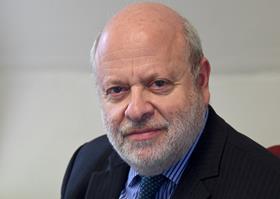The Law Society featured in one of the recent high-profile election stories, although in the most minor way possible.

When Jeremy Corbyn waved around documents at a press conference the other day claiming that the NHS is up for sale in a future UK-US trade agreement, there was a link in newspaper coverage to the full documents. It features accounts of a series of meetings held between UK and US negotiators. To my great surprise, a legal services meeting was among them.
Last November, I went to Washington DC on behalf of the Law Society to partake in a round-table between the UK and the US on legal services, in preparation for a future trade deal. The Law Society was not alone: all the UK professional bodies were represented, including the SRA. Each side described how our market worked, and talked about how we could take forward a future liberalisation of markets.
This was part of a round of talks that covered many sectors and issues – textiles, financial services, agriculture – although legal services were unique in having stakeholders present i.e. representatives of bars and law societies, and not just government trade negotiators.
At the time, the Department for International Trade (DIT) was extremely nervous about my mentioning anything about the meeting in print – which amused me when I saw that the full minutes of our meeting are now online for everyone to read.
I know that there has been talk about Russian disinformation being behind the leak, and that errors might have been slipped in to cause trouble. But, having read the minutes for the first time, on DIT-headed paper with ‘Official-Sensitive (UK eyes only)’ on every page, I can confirm that they accurately reflect our discussions.
One point struck me again on reading them. It concerns a problem for us post-Brexit after the introduction of the new Solicitors Qualifying Examination (SQE). At the moment in the EU, we solicitors can take advantage of free movement regardless of how we have each qualified, even if without a law degree, say. The EU does not permit other bars to look behind the title and forbid entry based on our route to qualification. They must accept the title regardless of how it has been obtained, provided of course that it was lawfully granted under the applicable rules in each member state. That will disappear after Brexit, and world-wide we will have our route to qualification examined much more closely.
For instance, this is what the leaked UK-US minutes from the DIT say on the topic:
‘On the point around recognition of UK title regardless of route to qualification, LT (US) suggested the US preferred to look at the duration and substance of someone’s education, rather than simply accepting the ‘title’ as sufficient. This was an ‘activity’ based approach, which considers what subjects someone has studied, and then deciding whether that is adequate to meet State regulations. LT argued that this was to ensure high standards. JM (US) commented that she had seen the ‘bottom of the barrel’ when it came to foreign lawyer practice in the US, and there was a fear that if you opened up the admissions regulation to only look at ‘title’, rather than route to qualification, then this could pose a risk to the quality of service being provided.
JG (UK) responded by pointing out that across the EU, recognition of lawyers is title based, and does not involve a process of looking ‘behind the title’ to education. This was said to work well enough even though there were obvious differences across the EU jurisdictions.’
There have already been concerns expressed by the Law Society that the SQE will dumb down standards on qualification for a number of reasons – for instance, because of the removal of the requirement for a qualifying law degree or a graduate diploma in law, which is probably the most serious change from an international perspective, and the additional removal of the practical legal skills assessment (which will mean a total reliance on multiple-choice questions to assess functioning legal knowledge). The Law Society is vigorously pursuing these points with the SRA at the moment.
It is important that changes to our route to qualification do not put up barriers to our solicitors being able to trade in legal services worldwide.
Legal services are complicated enough in a UK-US trade deal because the federal government undertakes the negotiating, while legal services are regulated at state level, mainly by the state supreme courts, making it almost impossible for the federal government to commit to anything on its own.
All the same, both governments have committed in the minutes to giving support to a future dialogue between the two professions to help us towards solutions.































No comments yet